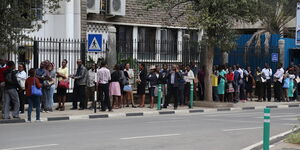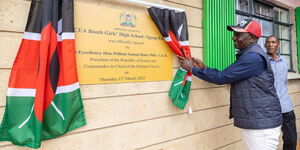In the wake of the Mau Mau uprising that started in 1952, the British colonial administration was faced with an uphill task of containing the liberators who were fighting for Kenya's independence.
Informed by the growing concerns over the activities of the Mau Mau fighters, the colonial government asked for reinforcement from England.
Consequently, in 1953, Britain's National Service sent more soldiers to Kenya. Among them was 19 -year-old, David Larder.
Unknown to him, his experience would completely change his life and his views on colonialism.
The new soldiers were given shoot-to-kill orders. Apart from suspected Mau Mau fighters, the soldiers were ordered to execute women who supplied food and other necessities to the fighters.
Additionally, the soldiers were promised rewards for every person they assassinated as Mau Mau had been outlawed and labelled a terrorist organisation.
In a news article published in the Guardian in 2013, Larder documented his own experience when he shot a youth who was unarmed.
"The man had no weapons, only a piece of the Bible and part of an English-language primer in his pocket," he recorded.
Larder stated that the incident was an eye-opener that prompted him to oppose the orders given by his superiors. His actions saw him cross paths with his supervisors.
Additionally, he disclosed that his determination for change was further reinforced after he saw his colleague die after he was neglected by the colonial administration. The compatriot had fallen ill.
After the incident, he openly disobeyed the Mau Mau orders which saw him subjected to disciplinary action, and was even dismissed from the force.
"I still suffer from memories of the British apartheid system and numerous instances of arbitrary killing and brutality by British forces, Kenya Police, and Kenyan African Rifles. In reality, we protected land-grabbing British farmers and enriched UK companies," he stated.
Despite moving back to the UK, Larder continued with his advocacy in calling for Kenya's independence and even faced another trial for his actions.
"After campaigning around the country for Kenya's independence, I received new call-up papers, because I had not finished my national service. I then decided to stand trial and became the first British man allowed to be registered as a conscientious objector against colonial warfare," he added.
In his article titled, Pilloried As a Conchie, published in the Guardian, the former soldier stated that he felt vindicated as the Mau Mau story and the injustices committed by the colonialists were well documented worldwide.
Back in the UK, Larder joined the teaching profession and completed his course in 1958. He was then enrolled as a teacher at Darton School in Barnsley and held other roles in the UK education sector until his demise on March 18 at the age of 88.
The former soldier had two wives and six children.












